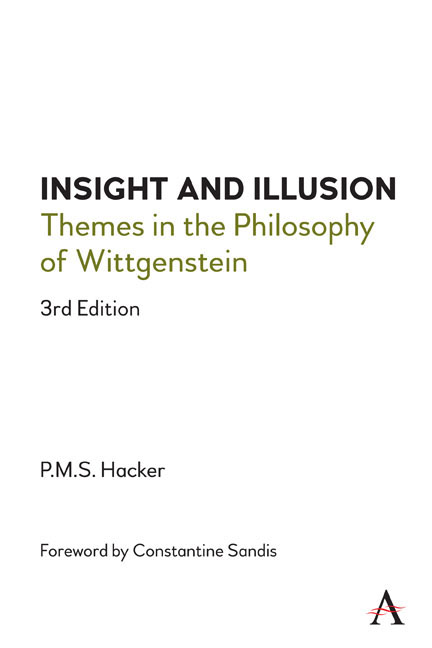Book contents
- Frontmatter
- Dedication
- Contents
- FOREWORD
- PREFACE TO THE REVISED EDITION
- PREFACE TO THE FIRST EDITION
- LIST OF ABBREVIATIONS
- I WITTGENSTEIN’S EARLY CONCEPTION OF PHILOSOPHY
- II THE DIALOGUE WITH FREGE AND RUSSELL
- III MEANING, METAPHYSICS, AND THE MIND
- IV EMPIRICAL REALISM AND TRANSCENDENTAL SOLIPSISM
- V DISINTEGRATION AND RECONSTRUCTION
- VI WITTGENSTEIN’S LATER CONCEPTION OF PHILOSOPHY
- VII METAPHYSICS AS THE SHADOW OF GRAMMAR
- VIII THE REFUTATION OF SOLIPSISM
- IX PRIVATE LINGUISTS AND PUBLIC SPEAKERS
- X ‘A CLOUD OF PHILOSOPHY CONDENSED INTO A DROP OF GRAMMAR’
- XI CRITERIA, REALISM AND ANTI-REALISM
- INDEX
VIII - THE REFUTATION OF SOLIPSISM
Published online by Cambridge University Press: 24 February 2022
- Frontmatter
- Dedication
- Contents
- FOREWORD
- PREFACE TO THE REVISED EDITION
- PREFACE TO THE FIRST EDITION
- LIST OF ABBREVIATIONS
- I WITTGENSTEIN’S EARLY CONCEPTION OF PHILOSOPHY
- II THE DIALOGUE WITH FREGE AND RUSSELL
- III MEANING, METAPHYSICS, AND THE MIND
- IV EMPIRICAL REALISM AND TRANSCENDENTAL SOLIPSISM
- V DISINTEGRATION AND RECONSTRUCTION
- VI WITTGENSTEIN’S LATER CONCEPTION OF PHILOSOPHY
- VII METAPHYSICS AS THE SHADOW OF GRAMMAR
- VIII THE REFUTATION OF SOLIPSISM
- IX PRIVATE LINGUISTS AND PUBLIC SPEAKERS
- X ‘A CLOUD OF PHILOSOPHY CONDENSED INTO A DROP OF GRAMMAR’
- XI CRITERIA, REALISM AND ANTI-REALISM
- INDEX
Summary
Introduction
Wittgenstein's claims that a philosophical problem has the form—'I don't know my way about’ (PI,§123) and that his own purpose in philosophy was ‘to show the fly the way out of the flybottle’ (PI,§309) are notorious. What is less well known is that the archetypal fly in the original flybottle was the solipsist. In the ‘Notes for Lectures on “Private Experience” and “Sense Data“', written between 1934 and early 1936, Wittgenstein wrote:
The solipsist flutters and flutters in the flyglass, strikes against the walls, flutters further. How can he be brought to rest? (NFL, p. 300.)
The puzzles surrounding solipsism thus became for Wittgenstein a paradigm of the diseases of the intellect to which philosophers are so prone. The solipsist, like the idealist, is caught in the net of grammar, and by disentangling the knots tied by his futile struggles one can better understand Wittgenstein's conception of philosophy and its methods. His refutation of solipsism comes in three phases. The first stage is to be found in the writings and reports of the transitional period from 1929 to the academic year 1932/3. The Philosophical Remarkis particularly important here, but the notes taken by Waismann and Moore are also significant. The second and most revealing phase of his concern with uncovering the errors of solipsism (in particular) and idealism (in general) is between 1933 and 1936. The Blue Bookand ‘Notes for Lectures’ contain Wittgenstein's most important arguments in refutation of solipsism. The third and final phase finds its full expression in the Investigations,with some additional material in Zettel.Here the direct and overt interest in solipsism is diminished, and its place taken by the fully-developed argument against the possibility of a private language, a brief sketch of which had already appeared in the ‘Notes for Lectures'. Although solipsism is only indirectly alluded to, most of the arguments developed in the second phase reappear in highly condensed form in the Investigationsand Zettel.The task of the present chapter is to trace the process whereby Wittgenstein gradually freed himself from metaphysical illusion. I shall first examine the intermediate period between the Tractatusand the Blue Book,and then show how the elegant and comprehensive refutation of solipsism and idealism emerged in the second, mature phase. The argument against the possibility of a private language will be examined in detail in the following chapter.
- Type
- Chapter
- Information
- Insight and IllusionThemes in the Philosophy of Wittgenstein, pp. 215 - 244Publisher: Anthem PressPrint publication year: 2021

